Current Issue
Mediation through a Gender Lens : Perspectives from the Community to the International LevelVolume 11, No. 1, Spring 2025
Editor: Sumona Das Gupta
About the Journal
Peace Prints, a South Asian Journal of Peacebuilding, is a peer-reviewed journal published by WISCOMP (Women in Security, Conflict Management and Peace), an initiative of the Foundation for Universal responsibility of His Holiness The Dalai Lama, New Delhi. Providing a space for research on issues that lie at the intersection of gender, conflict, peace and security, the journal serves as a resource for practitioners and scholars working in the field of peacebuilding in the South Asian region.Archives
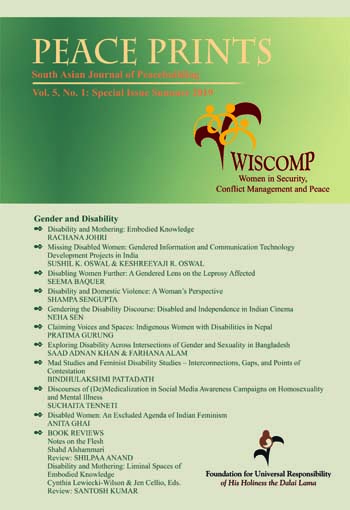 |
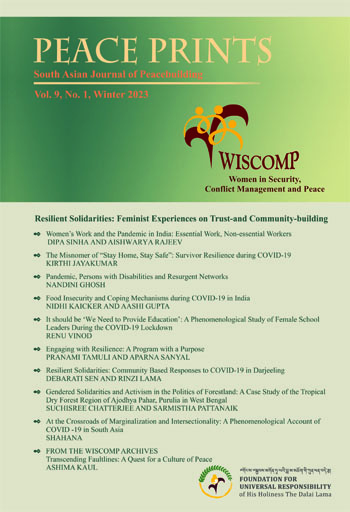 |
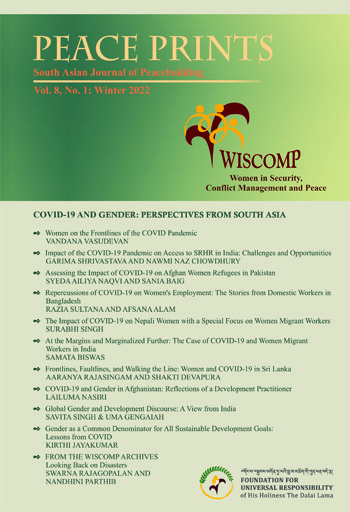
|
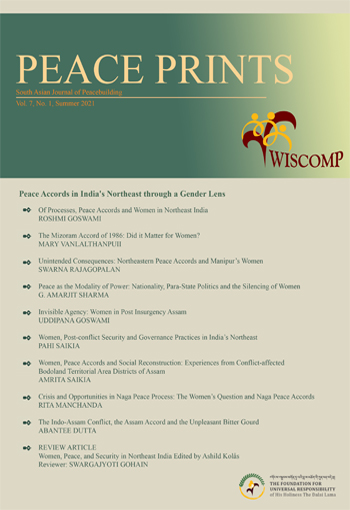
|
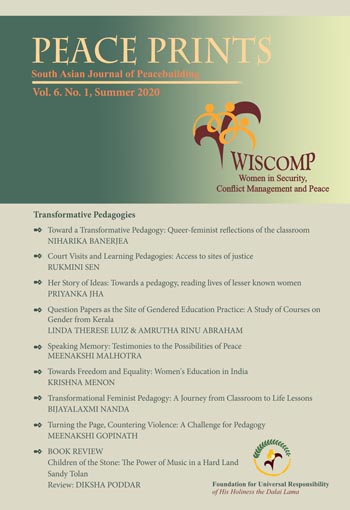 |
|
Being "(Re) Armed": Women and the Security Sector
Volume 10, No. 1, 2024 |
Resilient Solidarities: Feminist Experiences on Trust-and Community-building Volume 9, No. 1, 2023 |
COVID-19 and Gender: Perspectives From South Asia Volume 8, No. 1, 2022 |
Peace Accords in India's Northeast through a Gender Lens Volume 7, No. 1, 2021 |
Transformative Pedagogies Volume 6, No. 1, 2020 |
 |
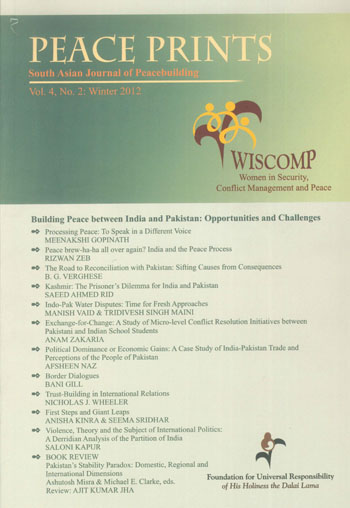 |
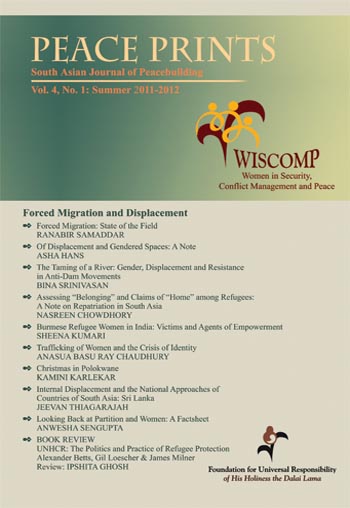 |
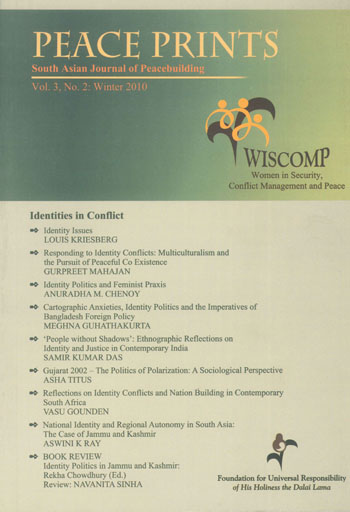 |
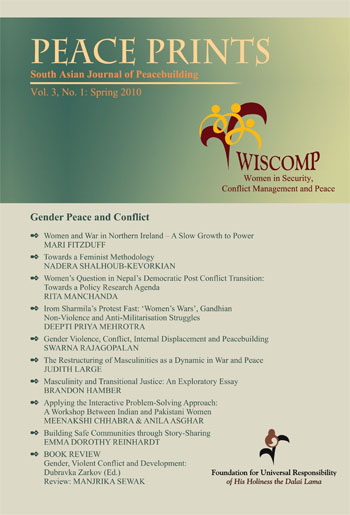 |
|
Gender and Disability
Vol. 5, No. 1, 2019 |
Building Peace between India and Pakistan
Vol 4, No 2, 2012 |
Force Migration and Displacement Vol 4, No 1, 2011-12 |
Identities in Conflict
Vol 3, No 2, 2010 Special Edition |
Gender Peace and Conflict
Vol 3, No 1, 2010 |
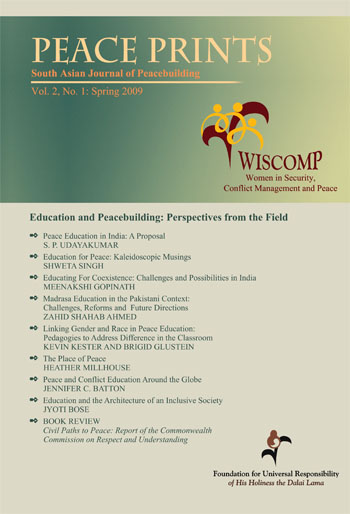 |
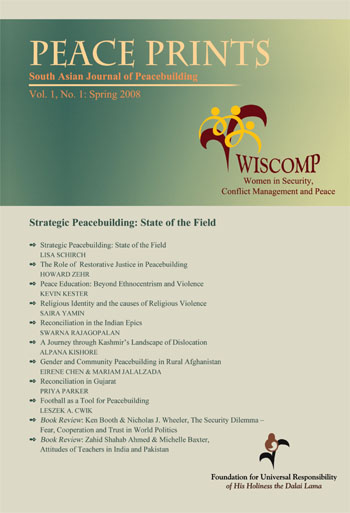 |
|||
| Education and Peacebuilding Vol 2, No 1, 2009 |
Strategic Peacebuilding: State of the Field
Vol 1, No 1, 2008 |
Editorial Board
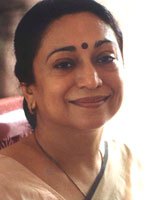
Meenakshi Gopinath
Editor-in Chief
Director, WISCOMP
Core 4A, UG Floor India Habitat Centre,
Lodhi Road, New Delhi 11003
director@wiscomp.org
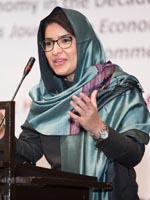
Mariam Safi
Founder and Executive Director,
DROPS
mariamsafi@dropsafghanistan.org

Anna-Kaisa Heikkinen
Head of Mission at Finland’s Embassy - Mozambique,
Avenida Julius Nyerere, 1128,
Maputo, Mozambique
Anna-Kaisa.Heikkinen@formin.fi
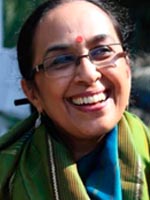
Krishna Menon
Professor, School of Human Studies,
Ambedkar University Delhi
Lothian Rd, Kashmere Gate,
Delhi, 110006
krishnamenon@aud.ac.in
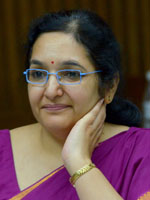
Seema Kakran
Deputy Director, WISCOMP
Core 4A, UG Floor India Habitat Centre,
Lodhi Road, New Delhi 11003
seema@wiscomp.org
Advisory Board
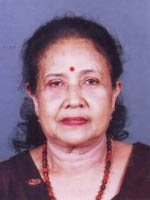
Prof. Selvy Thiruchandran
Trustee and Board Member,
Women's Education and Research Centre,
Sri Lanka
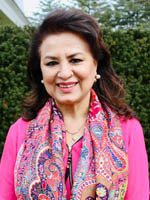
Bandana Rana
Former Vice-Chair, UN CEDAW Committee &
Executive Chair, Saathi,
Nepal
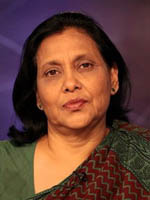
Prof. Amena Mohsin
Professor
University of Dhaka
Bangladesh
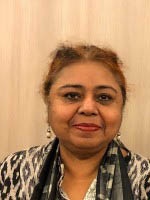
Dr. Meghna Guhathakurta
Executive Director,
Research Initiatives,
Dhaka, Bangladesh
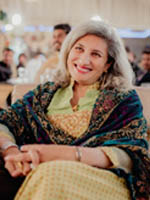
Dr Salma Malik
Assistant Professor,
Quaid I Azam University,
Pakistan
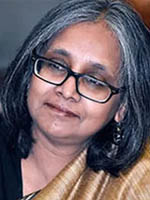
Dr. Sumona Das Gupta
Independent Researcher,
New Delhi,
India
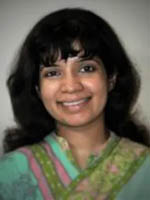
Manjrika Sewak
Assistant Director - on sabbatical,
WISCOMP
Returning with a Renewed Mission!
Peace Prints is back after a hiatus of six years with a renewed mission to enhance its footprint not just in South Asia but beyond. In keeping with the expansion in the domain of Peacebuilding, Peace Prints has expanded its scope to include the emerging frontiers of scholarship and research. The organizational and funding constraints have been overcome. In this new phase of reorganization, we infuse this pioneering effort with the energy that comes with expanding circles of engagement and linkages to wider networks of both experienced and younger researchers.About WISCOMP
WISCOMP, an initiative of the Foundation for Universal Responsibility has been a pioneer in initiating the discourse on women, peace, and security in South Asia. It was at the forefront of engaging with these issues, well before they found articulation in the UN Security Council Resolution 1325 in October 2000. Its efforts have yielded a robust network across borders and boundaries that highlight the leadership of women in the areas of peace and security—a space that was hitherto not fully encouraging of the participation of women.WISCOMP is an initiative of the Foundation for Universal Responsibility, which was established with funds from the Nobel Peace Prize awarded to His Holiness The Dalai Lama in 1989.
For more information, visit www.wiscomp.org


